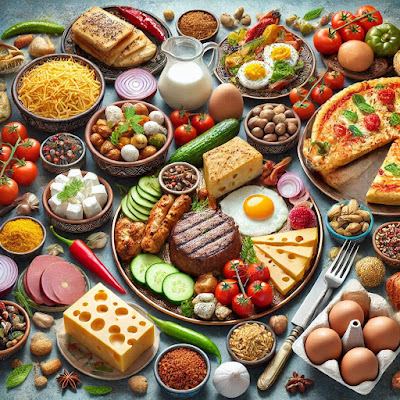Vegetable Proteins: The Plant-Based Powerhouses
- Get link
- X
- Other Apps
Vegetable Proteins: The Plant-Based Powerhouses
Vegetable proteins, derived from plant sources, are a significant component of nutrition due to their role in muscle repair, growth, and overall health. These plant-based sources, such as legumes, seeds, and nuts, provide essential proteins, fiber, and nutrients necessary for the body.
Vegetable Proteins in the Qur'an and Hadith
The Qur'an and Hadith highlight the importance of foods that sustain and nourish the body. While the Qur'an does not specifically mention vegetable proteins, it encourages the consumption of wholesome, natural foods, which include legumes and other plant-based sources.
Quranic Insight: "And He it is who sends down rain from the sky, and We bring forth thereby fruits of various kinds, and from it We cause to grow the plants that yield seed, and the date palms, and the vine, and all kinds of fruits..." (Qur'an, 6:99)
This verse underscores the multitude of plant-based foods Allah has created, providing sustenance for humanity, which includes legumes such as lentils, chickpeas, and beans that are rich in vegetable proteins.
Shia Hadith Insights: In Shia traditions, Prophet Muhammad (PBUH) and the Ahlul Bayt (the family of the Prophet) emphasized a balanced diet that includes both animal and plant-based foods. A relevant hadith from Al-Kafi states:
"The best of foods are those that come from the earth, such as legumes, grains, and fruits." (Al-Kafi, Volume 6, Hadith 7)
This hadith emphasizes the importance of plant-based foods, highlighting the value of legumes and grains in sustaining health.Another Shia narration from Tafseer al-Ayashi mentions the benefits of legumes such as lentils for health:
"Lentils are a blessed food, full of benefits, and should be eaten frequently." (Tafseer al-Ayashi)
Scientific Perspective on Vegetable Proteins
Vegetable proteins are derived from legumes, nuts, seeds, and certain vegetables. These proteins provide essential amino acids and are rich in fiber, vitamins, and minerals. Unlike animal proteins, plant-based proteins are generally lower in saturated fat, cholesterol-free, and more sustainable for the environment.
Common vegetable protein sources include:
- Lentils
- Chickpeas
- Beans (black beans, kidney beans, pinto beans)
- Peas
- Nuts and seeds (almonds, sunflower seeds, pumpkin seeds)
- Tofu and Tempeh (made from soybeans)
Benefits of Vegetable Proteins
- Lower in Fat: Plant-based proteins tend to be lower in fat compared to animal-based proteins.
- Rich in Fiber: Helps with digestion and promotes heart health.
- Sustainable: Plant proteins have a lower environmental footprint compared to meat.
- Cholesterol-Free: Plant proteins do not contain cholesterol, making them beneficial for heart health.
Vegetable Protein Consumption and Islamic Dietary Teachings
Shia dietary teachings emphasize a balanced and healthy approach to food. The consumption of plant-based proteins like legumes, beans, and nuts is encouraged, as they contribute to a well-rounded diet. The Hadith mentions moderation in all things, including food, and highlights the benefits of consuming plant-based proteins.
Recommended Vegetable Protein Consumption:
While specific ratios of consumption are not detailed in Islamic teachings, a balanced diet incorporating both plant-based proteins and other food groups like grains, fruits, and vegetables is encouraged for overall health.
List of Popular Vegetable Proteins from Different Cultures
- Lentils: A high source of protein and fiber, frequently used in soups and curries.
- Chickpeas: Commonly used in dishes like hummus and falafel.
- Beans: Black beans, kidney beans, and pinto beans are widely used in stews and rice dishes.
- Peas: Common in stews and pilafs across various cultures.
- Nuts & Seeds: Almonds, sunflower seeds, and chia seeds provide protein, healthy fats, and antioxidants.
- Soy Products: Tofu and tempeh are rich in protein and contain all nine essential amino acids.
Recipes from Pakistan, Lebanon, Iran, and Turkey
Here are some classic vegetable protein-rich recipes from these countries:
Pakistani Recipes:
- Dal (Lentil Curry): A simple and hearty curry made from lentils, cooked with spices like cumin, coriander, and turmeric. A classic comfort food rich in plant-based protein.
- Chana Masala (Chickpea Curry): Chickpeas cooked with onions, tomatoes, and a variety of spices for a filling and flavorful meal.
Lebanese Recipes:
- Hummus: Blended chickpeas, tahini, olive oil, lemon juice, and garlic make for a delicious, protein-rich dip.
- Mujadara: A combination of lentils, rice, and caramelized onions. It’s a fulfilling, protein-packed dish popular in Lebanon and Syria.
Iranian Recipes:
- Kashk-e Bademjan (Eggplant and Lentil Stew): A savory Persian dish that combines lentils, eggplant, and herbs, providing a hearty source of vegetable protein.
- Adas Polo (Rice and Lentil Pilaf): A rice and lentil dish seasoned with saffron, fried onions, and spices, rich in protein and flavor.
Turkish Recipes:
- Mercimek Köftesi (Lentil Patties): These red lentil patties are combined with bulgur, onions, and spices, making for a nutritious and flavorful snack or main course.
- Fasulye Pilaki (Green Bean Stew): A comforting dish made with green beans, olive oil, garlic, and onions, often served with rice.
List of Vegetable Protein-Rich Foods
- Lentils: Rich in protein, iron, and fiber, they provide a great source of plant-based protein.
- Chickpeas: Full of protein, fiber, and minerals such as magnesium and potassium.
- Beans: Black beans, kidney beans, and pinto beans are great for protein, fiber, and micronutrients.
- Peas: High in protein and fiber, peas are an excellent addition to soups, salads, and stews.
- Nuts and Seeds: Almonds, walnuts, and sunflower seeds are nutrient-dense and rich in protein.
- Soybeans (Tofu and Tempeh): Complete proteins that contain all nine essential amino acids.
Nutritional Information on Common Vegetable Protein Oils:
- Olive Oil: Rich in monounsaturated fats and antioxidants, promoting heart health.
- Peanut Oil: High in healthy fats and a good source of vitamin E.
- Sunflower Oil: Contains vitamin E and is low in saturated fats, supporting overall health.
Sources:
- Qur'an, 6:99
- Al-Kafi, Volume 6, Hadith 7
- Tafseer al-Ayashi, Hadith on Lentils
- Get link
- X
- Other Apps




Comments
Post a Comment